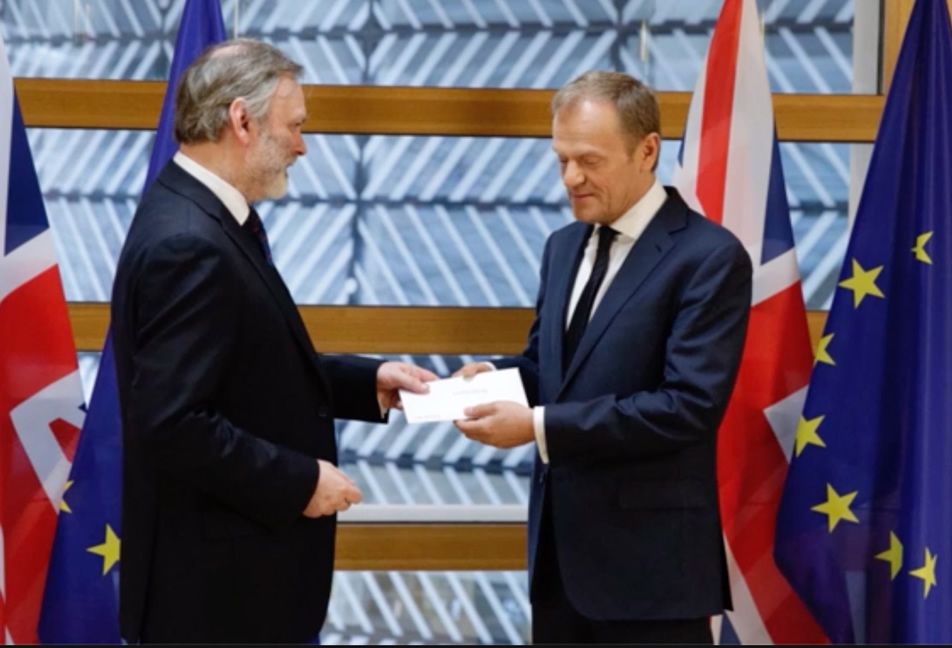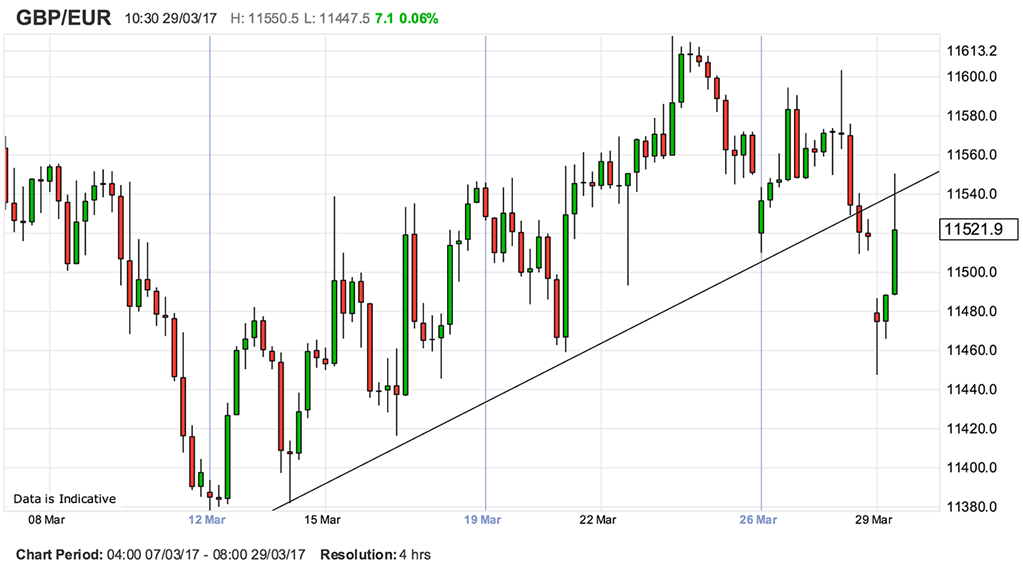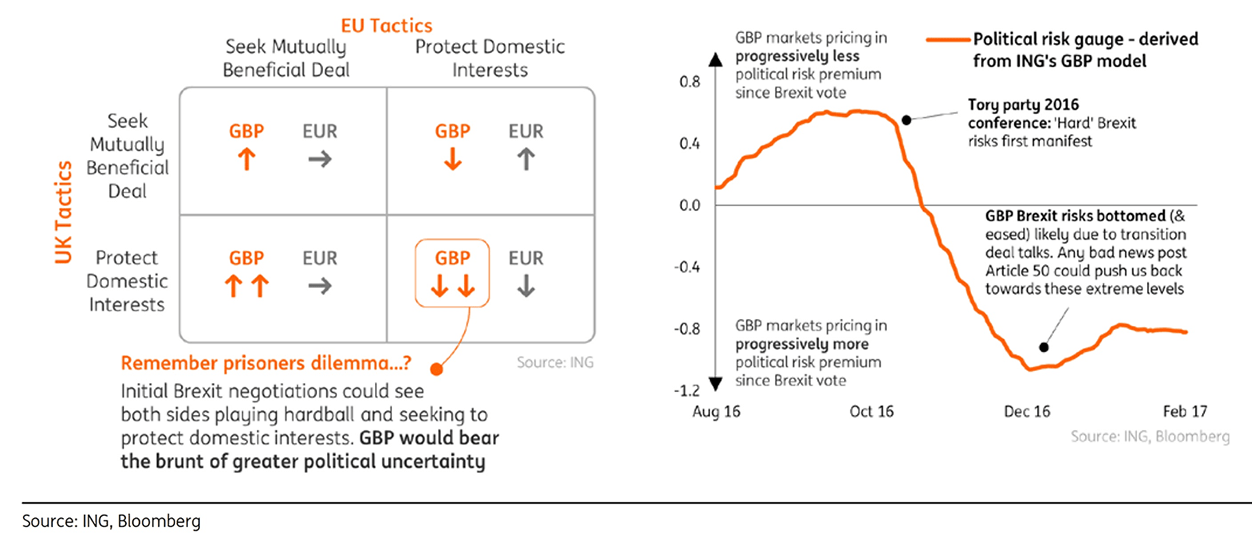ING's Pound / Euro Exchange Rate Forecast: A Prisoner's Dilemma

Above: President of the EU Commission Donald Tusk takes hold of a letter signalling the UK’s desire to leave the European Union and in the process Article 50 of the Lisbon Treaty is enabled. Credit: European People’s Party.
- Pound to Euro exchange rate today (30-3-17): 1.1565, best level of the past week: 1.1620
- Pound to Dollar exchange rate today: 1.2438, best level of the past week: 1.2616
Downside in the Pound Sterling complex looks inevitable according to a prominent foreign exchange analyst we follow.
According to Viraj Patel, a foreign exchange strategist with ING in London, the matrix of potential outcomes in upcoming Brexit negotitations advocate for a weaker currency.
"The red lines drawn in the draft EU proposal have raised the odds of political stalemate in the early phase of Brexit negotiations," says Patel. "The trick for investors will be to wade through the political noise. We do not see any fundamental reason for a ‘sell the rumour, buy the fact’ type of reaction from GBP."
Patel reckons the recent hawkish Bank of England re-pricing and cleaner GBP positioning means that downside risks have increased and it won't take much bad news for GBP to jolt lower.
"Arguably, we may have already seen the start of this bearish realignment given that GBP weakened after the Scottish Parliament backed the call for SNP leader Nicola Sturgeon to request a second independence referendum (which could be made to Westminster this week)," says Patel.
ING’s attention will be focused on any news that sheds light on whether the UK is on course for a hard or soft Brexit.
“Current GBP levels are not in our view pricing in the tail risk of a ‘cliff edge’ Brexit – an automatic default to WTO rules – especially given talk from both sides in recent months over the need for a transition deal,” says Patel. (see RHS chart below).
Patel’s views are echoed elsewhere in the institutional analyst community with the likes of Standard Chartered and Deutsche Bank saying recently that the Pound faces significant downside as markets have been far too sanguine on the risks facing Sterling of late.
Should EU officials place greater initial focus on factors like the Divorce Bill – and demote the need for a smooth transitional deal – then ING would expect GBP to react negatively.
“Transition plans are necessary given the likelihood that a new UK-EU trading relationship may not be formed within the two-year negotiating year; the clock is ticking once Article 50 is triggered and any initial political stalemate – or anything that pushes us closer towards the proverbial cliff-edge – could tip GBP over,” says Patel.
ING's Potential Targets for the Pound
In deriving the Pound’s potential moves over coming days, a simple application of game theory helps here (look back to the chart above).
“Our economists note that the negotiations – at least in the initial phase – are likely to be tricky and fairly inconclusive. With both parties seeking to run with their own agendas, we are more than likely to see the sub-optimal – or prisoner’s dilemma – outcome of greater investment uncertainty in the short-term,” says Patel.
And, GBP will have to bear the brunt of this lack of political clarity and the risks are for some hysteresis effect or a permanent loss investment.
“Putting some numbers on this, there’s nothing stopping GBP trading with a 5% uncertainty premium at certain points over the next three to six months,” says Patel.
Analysts warn this could drive Pound to Dollar exchange rate below 1.20 and the Euro to Pound exchange rate towards 0.90.
EUR/GBP at 0.90 equates to a GBP to EUR exchange rate at 1.1111.
“GBP upside looks limited from here as the focus shifts back to the bleaker medium-term bearish fundamentals,” says Patel.
However, we have observed that a number of commentators are confident Sterling has enough momentum in its tank to extend recent gains.
“Outside of a natural GBP risk aversion pullback, we suspect that the GBP will continue to rally against the USD and EUR,” says Peter Rosenstreich, head of market strategy at Swissquote Bank, based in Gland, Switzerland.
 Above: Sterling has enjoyed successive days of advances against the Euro in the lead up to the triggering of Article 50.
Above: Sterling has enjoyed successive days of advances against the Euro in the lead up to the triggering of Article 50.
Bank of America: April Could be a Good Month for Sterling
Meanwhile strategists at Bank of America Merrill Lynch Global Research have updated clients on their views pertaining to Sterling's outlook.
"Our bias remains for renewed GBP weakness at the higher end of the 1Q17 technical range, but we are cognisant of the ongoing positioning unwind, positive April seasonal factors which has seen GBP rally in every April over the past twelve years and unconfirmed technical base," says a note from Kamal Sharma, FX Strategist at BofA Merrill Lynch.
Therefore, those watching Sterling could do well to allow it to advance a little further as the Article 50 triggering, "does not itself provide the catalyst for renewed GBP weakness".
But, upcoming Brexit negotiations could undo the currency.
"Market complacency on the ability of the UK and EU to strike a comprehensive deal within the timeline with the least political/economic disruption is the motivation for a move back towards the bottom end and test of the trading range," says Sharma.
So while a move towards the lows of the range can be expected we note that no crash to fresh multi-year lows are envisaged.
Volatility, and Nothing More Greets Article 50 Trigger
The British Pound rode a wave of volatility in the mid-week trading session following the UK's triggering of Article 50 in Brussels.
The currency walked into the day on the back foot but this weakness soon gave way to a recovery as both May and the President of the European Council, Donald Tusk, issued concilliatory statements in the aftermath of the triggering.
The British Pound had gone as low as 1.1445 against the Euro and 1.2375 against the Dollar as nerves dominated ahead of official start of the UK's exit from the European Union.
Volatility was to be expected as savvy traders take exposure to Sterling off the table ahead of any potential volatility that might arise from the opening stages of the UK's Brexit negotiating process.
But the recovery following the triggering of Article 50 suggests markets are waiting to hear more details from the UK and EU on the next steps forward before making big directional decisions.
"The Pound fell against the Euro early on ‘Article 50 Day’ but quickly unwound most of the losses as images flashed across the wires of Theresa May signing the letter. Another kneejerk plunge in Sterling after Article 50 is triggered is clearly possible, but seems unlikely," says Jasper Lawler, an analyst with London Capital Group.






